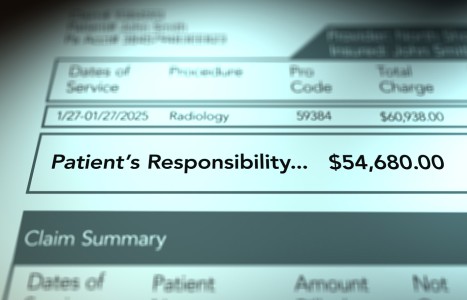Recent laws in New Jersey and California represent a disturbing trend that will negatively impact a practice’s ability to collect monies from patients, as well as expose them to significant penalties if the practice does not follow the mandatory guidelines to a T. Please be aware that a similar law may be coming to your state. The time to act is before the law is passed.
Primary Health Care: Our Scope of Practice
Primary health care (PHC) is a term used in most, if not all, states in this country. But what does primary health care really mean? Webster defines primary as, "something first in order, quality, importance, etc." The second question to ask is, what is health? According to the definition, "physical and mental well-being; freedom from defect, pain or disease; normality of mental and physical functions." We know it isn't the absence of symptoms. Is health defined by nutrition? Yes, but not entirely. Is it defined by adjustments? Again, yes, but not entirely, regardless of what some may think.
Webster defines the word care as, "charge, protection, custody," and many other synonyms. Health is not made up of any one thing. It encompasses many aspects of living. First aid is an aspect of health. Diagnosing injury, sickness, and disease is an aspect of health. Exercise is another element of health. My point is this: PHC as expected from the medical profession is an all encompassing one, albeit, defined by a very limited philosophy as well as practice.
How should we, as chiropractors and doctors, view our role as PHC providers? Do we limit our "primary" health care to simply adjusting? Do we throw in some therapy or vitamins to "round it out?" Are we really performing the role of providing PHC? The answer for 99+ percent of us is no.
The chiropractic profession, in general, understands that real, effective health care is much more than a massage, an adjustment or a vitamin. Our scope of practice covers, in most states, every aspect of health care short of drugs and surgery. Some even think it should include drugs and some surgical procedures.
Let's be honest. If we focus on the spine and adjusting, we can't be called "PHC providers" because we're not providing primary health care. We are providing a service the same as a masseur, an acupuncturist, a dentist or a host of other good and legitimate services. Are they "PHC providers?" Is adjusting a part of providing PHC? Yes! Is a massage a part of PHC? Yes! Is dentistry a part of PHC? Yes!
Let's notice, though, we don't have doctors of massage or doctors of physical therapy. A doctor of dentistry is providing an important but limited PHC service that supports personal PHC. The same with the other professions mentioned. Are they PHC providers in the true, complete sense of the word?
PHC, in the sense that people need it, can be best brought to light in the "ancient" art of the "family doctor." We like to think of ourselves as the "family doctor." But what are we really providing that makes us PHC providers in our day-to-day practice? What if someone brought little Mary in with a cut or scrape? What if we were called about a sickness? Is first aid a part of your daily practice? Is bandaging or steri-strips a normal aspect of what services you offer as a PHC provider. Have we become so big, so specialized, so important that we overlook the down-to-earth, "holistic" health care?
I realize that not everyone is interested in a practice such as I've described. I also realize that no one can do it all, especially in this day and age. My point is this: For the past eight years, I have been practicing exactly as a general practitioner/medical doctor would be except I have replaced drugs with natural substances and used such things as steri-strips in place of stitches. I have worked specifically with flu, colds, stomach problems, allergies, cold sores, ear infections, rashes, fractures, hiatal hernias -- you get the idea.
I have been a doctor providing holistic primary health care, encompassing nutrition, exercise, work and home lifestyle changes, adjusting, education, and first aid for injury and sickness. I have included adjustments for virtually all of the above conditions which are typically associated with medical doctors. My patients quite easily accept the chiropractic adjustment and philosophy about structure and function, because I include it as part of my services.
Primary health care is a natural for the natural doctor. Secondary health care is what should come after PHC if needed: drugs, surgery, radiation, chemotherapy, etc. In many cases it wouldn't be needed. I maintain a very good relationship with area hospitals and medical clinics. I don't have an x-ray machine, yet I've taken a patient personally to the medical clinic for x-rays. They give me the x-rays to read. The medical doctor sets and casts or stitches or prescribes the medication which is immediately needed.
I've called the MD about mild to moderate ear infections or inflammatory reactions and he's called in a prescription for antibiotics or anti-inflammatory medication. Admittedly, it is a unique situation, but it seems like such a normal relationship.
PHC should be utilizing natural substances, natural food, exercise, education, work and lifestyle analysis, with enhancement and change where necessary. Drugs, surgery and similar things should be last resort procedures and then only as temporarily supportive until health is regained. Isn't that the logical, reasonable way to provide PHC?
Perhaps if we, as a profession, begin to provide PHC, we would see a dramatic change in the public's understanding of health and health care. Presently, we are viewed as "back doctors", the same way a masseur or masseuse is viewed as a "muscle relaxation" specialist or a physical therapist as specializing in rehabilitation. We need to take stock of our standing, despite the recent good publicity chiropractic has received lately. It's really a drop in the bucket, almost a token sedative for our profession. We, unlike any other licensed professionals, have the ultimate practice potential in our very hands. We squabble, fight, and bicker over who and what we are. We can't come to any solid foundation. We fight to be accepted as primary health care providers, yet in practice, we limit ourselves to a myopic performance. The image we portray is the very one we loath and despise, and spend all our time fighting.
Is it "unnatural" to educate ourselves in good first aid procedures? Is it "mixing" to take an EMT or similar course? Is it "somebody else's job" to serve people in those areas or to discuss nutrition, use PT for injury rehab or bandage a wound or treat a sickness with natural supports?
Who is willing to discuss this? Will our state boards or our associations? Are we going to let this opportunity slip by until we get pigeonholed by laws, the medical profession or society into simply being "back doctors?" It's no wonder the term "doctor" being applied to a chiropractor is sometimes a joke in the public's mind. We are labeled "chiropractors," a very limited focus, "bone crunchers," another obvious reflection of being pigeonholed or referred in contrast to a "real" doctor.
Our state boards are as varied as our states, all saying different things or having variations in laws or scope of practice. Some states allow "this" and don't allow "that." Each state decides what a chiropractor is supposed to be, usually based on personal preferences. We have to take separate boards with separate requirements in every state. We are expected to be one thing in one state and something different in another. We are allowed to do something in one state, but one mile away in another state, we would be breaking the law.
The medical profession doesn't have to worry about limiting us; we are doing it ourselves. Is the medical profession as divided and confused in their scope of practice? Does an MD scope of practice change from one state to another? Are people confused about what to expect from the medical profession? It is only a matter of time before the medical profession comes around to a much more natural way of doing things in their practice. It's either that or perish.
Our scope of practice is the broadest and most inclusive of any health care provider in the world. Oregon even has minor surgery and childbirth as part of their scope of practice. Is it unnatural to deliver a baby? Is it unnatural to close up a wound? Those are very much a part of primary health care providing. Are we afraid of being true PHC providers?
If someone is satisfied and content offering adjustments only, then that is fine. Massages, therapies, nutritional consultation, etc., are respectful, honorable, and necessary professions. Perhaps the DC should refer to strict adjusters of joints of the body. Perhaps DCM, doctor of chiropractic medicine would be a better title. After all, to practice with our hands doesn't limit us to adjusting, does it? Minor surgery is practicing with our hands. So is delivering a baby, therapy, massage, and first aid. You get the idea?
Are we going to simply continue to talk about it? "Politics as usual," to borrow a phrase. I challenge the state boards, the state and national associations, and the general profession to get it together and act on what we have before we lose it. We are dragging our feet and not acting at the "grass roots" level of the problem. We are the cause of our problems. Let's form a forum, a think tank, and do it on a national level. Let's become more unified about who and what we are. If we don't know, how can the public know?
A member from every association and state board could convene for talks. "DC" can act as the "town hall." We need to do some soul searching here. To date we have been merely scratching the surface of our problems. Unless we get on the bandwagon and take this thing seriously, we will wake up one day and wonder how we lost such an incredible practice potential and were forced into being just "back doctors." The handwriting is on the wall. We are already being slowly hedged out by physical therapists, medical doctors, and osteopaths. The race is on. Unless we shore up and strengthen our position in our own eyes as well as those of the public, we will lose the race. That's the only absolute the chiropractic profession presently has. What we sow is what we will reap. Does anyone believe that?
Jeffrey T. Maehr, D.C.
Pasadena, California


